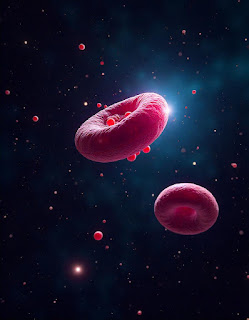Space Anemia

Understanding Space Anemia
First of all , just know what does the term Anemia means?
Anemia is a blood disorder characterized by a lower than normal number of red blood cells or a decrease in the quality of red blood cells. This results in a reduced ability of the blood to carry oxygen throughout the body.
Causes of Anemia
Anemia can be caused by several factors, including:
- Blood loss: This can occur due to injuries, heavy menstrual bleeding, or gastrointestinal bleeding.
- Increased red blood cell destruction: Certain diseases or conditions can cause the body to destroy red blood cells faster than they can be replaced.
- Decreased red blood cell production: The bone marrow may not produce enough red blood cells due to factors such as nutritional deficiencies, genetic disorders, or medications.
Causes:
- Microgravity: The reduced gravity in space causes changes in the body's fluid distribution. Blood tends to pool in the upper body and extremities, away from the legs. This can lead to a decrease in the production of red blood cells by the bone marrow.
- Reduced erythropoietin (EPO) production: EPO is a hormone produced by the kidneys that stimulates red blood cell production. In space, the body may produce less EPO due to changes in fluid balance and kidney function.
Symptoms:
- Fatigue: The decrease in red blood cells can lead to reduced oxygen delivery to tissues, causing tiredness and fatigue.
- Paleness: The lack of red blood cells can cause the skin to appear pale.
- Shortness of breath: Reduced oxygen levels in the blood can make breathing difficult.
- Dizziness or lightheadedness: Low blood pressure and reduced oxygen supply to the brain can cause dizziness or lightheadedness.
Treatment:
- Regular exercise: Exercise can help counteract the effects of microgravity on fluid distribution and stimulate red blood cell production.
- Blood transfusions: In severe cases, blood transfusions may be necessary to replenish red blood cells.
- Artificial gravity: Some studies have suggested that creating artificial gravity through rotating spacecraft could help prevent space anemia.
It's important to note that space anemia is a temporary condition that usually resolves upon return to Earth. However, it's a significant health concern for astronauts on long-duration missions, and ongoing research is focused on understanding and mitigating its effects.
Sharing with you various stories covering the health concerns posing over 2 astronauts i.e. Sunita Williams and Butch Wilmore who are stuck in space for nearly 4 months now and their stay has also been extended to early 2025.





Comments
Post a Comment